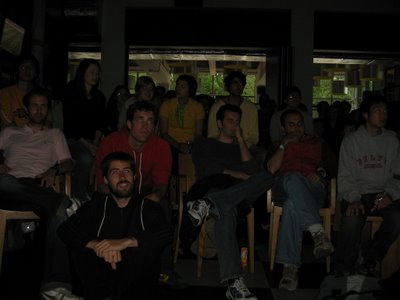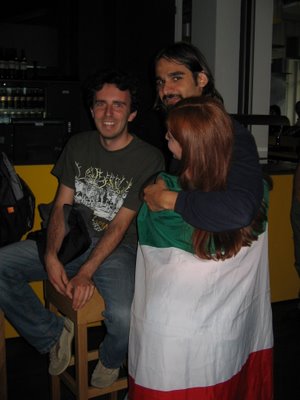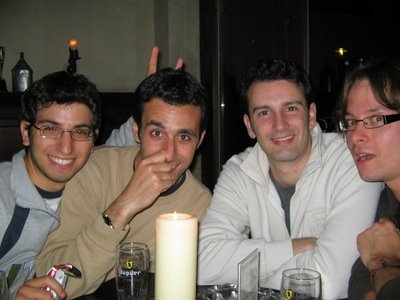When I registered at the Delft City Hall, I got a couple of tickets for the "Filmhuis Lumen", so on Saturday I went to the cinema with Max and Lars to watch Syriana.
I found it entertaining, it's about a conspiracy around the oil industry. However, like in 99% of the movies that are inspired in real facts, the director (or producer, or anyone with power over the film making) tries to "prove" his point, show the world the way he sees it, or imprint the story with his personal opinion. In order to achieve this, these movies are rich in half-trues, fact twistings, and lies.
Here are some of the lies this movie uses to criticize the US government and the US oil industry:
In the movie: The CIA uses islamic terrorist to make attacks on chinese oil refineries, to make sure that the US gets all of the oil and China gets nothing.
Reality: Almost all of the terrorist objectives are US.
In the movie: Prince Nasir Al-Subaai, next in the line to become Emir of a country in the Persian Gulf, wants to reform his country: give rigths to women, modernize his country, sell oil to China and therefore assure prosperity to his people; but he sais that by doing this, he'll become a "bad guy" to the eyes of occident: he'll be called communist, suffer embargos, etc.
Reality: The Kings of the arabic gulf are criticized for exaclty the opposite: living in ridiculous wealth and maintaining their people in misserable poverty and life conditions. Instead of being pushed and influenced, they have a big influences in US presidents and politics, because they have a huge power over the world's economy.
Here are some ways movies have being used to influence people:
War movies and espionage: The idea is very similar to the gladiator shows in the Roman Empire: to prepare the stomachs of the population for brutalities of war, and make it popular in order to prevent a lack of volunteers, by glorifying violence (e.g. Saving Private Ryan). An extreme case may be the spy movies (e.g. James Bond): poeple associate a glamorous life with spies, instead they must spend years of silent infiltration, only to be caught, tortured, mutilated and killed. However, sometimes the purpose is to protest against war, and the movies show only bad aspects of the war (e.g. The Thin Red Line, most of Vietnam war movies). I think it was Stanley Kubrick who said something like: "war movies shouldn't be about the good or the bad things of war, but about the good and the bad".
Cold War movies: They confront US and russians, generally in sports or any sort of competition: the goodies win and the baddies lose. The goodies are from the country where the movie is produced, and the baddies are from the other country (Rocky).
There are many more. I'll just recall one more particular example:
U-571: This movie shows the heroism of the american sailors who captured the Enigma encoding german machine of the U-571 german submarine. It is a true story, except for one detail: these sailors were not american, they were british.
ACTUALIZATION:
I've just remembered one of the saddest examples of this theory: Andres Wood's "Machuca". I have to say that I've refused to watch this movie, but I have listened to people: " bla bla,... this must never happen again, buuu, buuu...". I heard that in one scene a soldier stands in front of a child who looks communist, and then he fills him with bullets from his machine gun... WHEN THE HELL DID SOMETHING LIKE THIS EVER HAPPENED???!!! Andres Wood recognized himself that "this is not the official history of anything", but people just keep ascociating this movie financed by our left government with reality. This movie is just a lie, communist propaganda.

 The lasts days I've done almost nothing but studying and watching the world cup in the sports center of TUDelft.
The lasts days I've done almost nothing but studying and watching the world cup in the sports center of TUDelft.


 Sweden 0; Germany 2.
Sweden 0; Germany 2. 






 Portugal 1; Netherlands 0.
Portugal 1; Netherlands 0. 


 Italy 1; Australia 0.
Italy 1; Australia 0. Bye Salvatore, tell me if you ever go to Chile!
Bye Salvatore, tell me if you ever go to Chile!  What the hell... it's Che Guevara!
What the hell... it's Che Guevara! 


 Spain 1; France 3.
Spain 1; France 3.


























